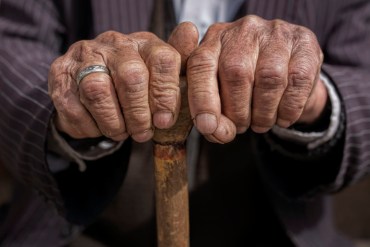Medicare Proposes Expansion Of Counseling Program For People At Risk Of Diabetes
A study finds that the program, developed by the YMCA, helped beneficiaries improve their diets, get more exercise and lose weight.
Some experts say this opportunity has not been realized, but advocates and policymakers are focusing on fixes that would make the digital versions of end-of-life planning documents easy for health professionals to locate.
Long-Term Care Insurance: Less Bang, More Buck
Seniors slammed with big premium increases face tough choices.
Doctors Ponder Delicate Talks As Medicare Pays For End-Of-Life Counsel
Physicians can now bill Medicare $86 for up to 30 minutes of counseling given to patients about end-of-life planning, but many doctors may need training to have those talks.
Prevention Experts, Eye Doctors Disagree On Vision Tests For Seniors
The U.S. Preventive Services Task Force says there is not enough evidence to know whether vision screening given by primary care doctors benefits patients.
Medicare To Test New Payment Approaches For Some Prescription Medications
Regulators unveiled a two-part plan that will change payments and test ways in which the Medicare Part B program can change the incentives that some policy experts say encourage doctors to choose higher-cost medications.
Housing Project Takes On Seniors’ Health
An innovative new approach in Oakland combines low-income housing and a health program for seniors.
Report Details Senior Health Care That Misses The Mark
New research from the Dartmouth Atlas Project identifies areas where older patients get care that doesn’t meet guidelines or their own goals.
UCLA Freshmen Learn About Growing Old
A UCLA course on aging teaches students about the physical, emotional and financial realities of growing old. Professors hope they will consider careers that serve the elderly.
The Agonizing Limbo Of Abandoned Nursing Home Residents
Even when the state orders nursing homes to readmit residents who have been in the hospital, its orders have no teeth.
A 401(k) Withdrawal Can Lead To Trouble For Health Plan Subsidies
The retirement savings are considered income, so an unexpected withdrawal may change the level of premium subsidies for which an individual qualifies.
Some Dialysis Patients Give Medicare Failing Grade On Ambulance Trial
A Medicare trial aimed at averting billing fraud and waste in nonemergency ambulance service in eight states is drawing complaints from patients’ families and ambulance companies.
Buying Supplemental Insurance Can Be Hard For Younger Medicare Beneficiaries
Congress left it to states to determine whether private Medigap plans are sold to the more than 9 million disabled people younger than 65 who qualify for Medicare. The result: rules vary across the country.
Hospitals Step Up To Help Seniors Avoid Falls
Falls are the leading cause of injuries for adults older than 65, but they don’t have to happen. A number of new initiatives are designed to make seniors stronger and less likely to take a tumble.
LA Chapter Splitting From National Alzheimer’s Association
The local group is one of several regional affiliates breaking away because of fears about losing flexibility as the national group begins a consolidation effort to gain more efficiency in operations.
Baby Boomers Set Another Trend: More Golden Years In Poorer Health
Medicare faces sharp cost increases as more baby boomers reach 65, and their life expectancies grow, as well as their chronic conditions, say researchers at the University of Southern California.
Rising Obesity Puts Strain On Nursing Homes
Residences for older adults are increasingly overwhelmed, and unprepared, for huge patients, and facilities rarely accept more than a few.
Add This To Challenges Of Old Age: Keeping Your Teeth
Many seniors either resist or can’t afford regular dental care, putting them at high risk of gum disease, tooth loss and other serious health complications.
Who Are America’s Caregivers? Nearly A Quarter Are Millennials
About 40 million Americans considered themselves caregivers in 2013, according to an AARP report.


























